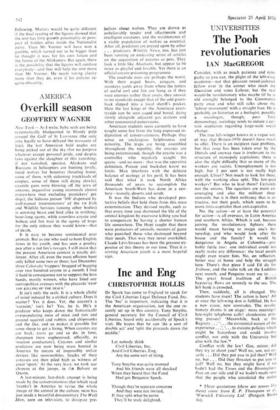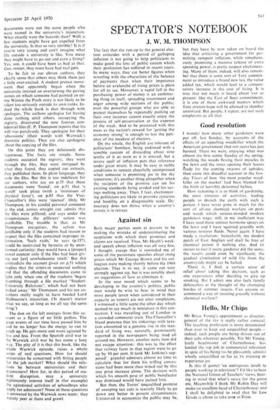UNIVERSITIES
The Pooh revolutionaries
IAN MacGREGOR
Consider, with as much patience and sym- pathy as you can, the plight of the left-wing academic—not that pleasant tweed-jacketed
fellow over in the corner who reads the Guardian and votes Labour, but the real
would-be revolutionary who maybe (if he is old enough) belonged to the Communist party once and who still talks about the 'labour movement' with a straight face. He is
probably an historian or a biologist, possibly a sociologist, though, pace Tory
demonology, sociology tends to induce a cer- tain scepticism regarding large-scale social change.
The true left-winger knows in a vague sort of way that Britain-1970 doesn't have much to offer. There is an incipient race problem, but that issue has been taken over by the liberals and anyway race is irrelevant to the structure of monopoly capitalism; there is also the slight difficulty that so many of the workers are racists. Unemployment is too high, but 3 per cent is not really high enough. Ulster? Not much to look for there, with the working class split. The low-paid workers? But who to lead them? Certainly not the unions. The squatters are more en- couraging and also the militant shop- stewards, but it is their militancy that is at- tractive. not their goals, which seem to be more infra-capitalist than anti-capitalist.
No, the action—or at least the potential for action—is all overseas, in Latin America and southern Africa. Which is sad, because joining the revolutionary fighters there would mean having to resign one's lec- tureship, and who would look after the house and the family? It would be dangerous in Angola or Colombia—pro- bably futile too: one individual could not really make any difference: the local people might even resent him. No, on reflection, better stay at home and help the struggle
here. There's that piece I said I'd do for Tribune, and the radio talk on the Luddites
next month, and Penguins want me to . . . The great broad tradition of British hypocrisy flows on serenely to the sea. The left bank is crowded.
Then, suddenly, all is changed. The students have risen! The action is here! All at once the left-wing don is fulfilled. He has a new cause, new comrades. The revolu- tionary drama is on stage: mass meetings!
late-night telephone calls! clandestine prin- ting presses! 'Meanwhile, back at the Registry ..."... the existential nature of the experience ...', to execute policies which might be hazardous and could involve conflict, not only with the University but also with the law.'• Conflict with the law! Gee, mister, did they try to shoot you? Well no, son, not ex- actly ... Did they put you in jail then? Well no, but .. . Did they threaten to put you in jail? Well no, but they might have if we
hadn't had the Times and the Birmingham Post on our side and if we hadn't made sure that the people who circulated the stolen * These quotations (there are scores like them) come from E. P. Thompson et al, 'Warwick University Ltd.' (Penguin Books 6s). documents were not the same people who were named in the university's injunction. What exactly were the hazards then? Well, a few students might have got expelled from the university. Is that so very terrible? It is if you're very young and can't imagine what life outside a university is like. You mean they might have to go out and earn a living? Yes, son, it could have been as bad as that. Gee, mister, they must have had real guts.
To be fair to our eleven authors, they clearly sense that others may think them just a little over-excited. A student protest move- ment that apparently began when the university insisted on overturning the paving stones on which someone had painted an en- tire Winnie the Pooh story is not likely to be taken too seriously outside its own ranks. In- deed the whole book is shot through with apologies. The authors apologise for having done nothing until others, occupying the registry, discovered the now famous con- fidential files (E. P. Thompson reports that his will was paralysed). They apologise for their 'obsessions' (their word) with Warwick's domestic politics. They are also apologetic about the copying of the files.
On this point they are deliciously dis- ingenuous. The facts are simple. Some students occupied the registry, they went through the files, they were intrigued by what they found, they copied out extracts, they published them. In plain language, they stole the files. But this is too indelicate for our authors, who say on p.35 that these documents were 'found', on p.51 that 'a search' took place (with a 'minimum of physical force'), on p.85 that the Vice- Chancellor's files were 'opened'. Only Mr Thompson, in his candid personal comment at the end, comes straight out, admits that the files were pilfered, and says under the circumstances the pilferers' action was justifiable. The trouble is that, as Mr Thompson recognises, the action was justifiable only if the students had reason to suspect that the files contained improper in- formation. 'Such raids,' he says (p.157), 'could be motivated by hysteria or by unin- formed curiosity; they would have a [proper] moral content only if the files had been giv- ing out [an] unwholesome smell.' But this contradicts the account given on p.5I which implies that the sitters-in suspected nothing and that the offending documents came to light only when one of the students 'began thumbing through a file marked "Student- University Relations", which had not been locked away.' Mr Thompson and his ten co- authors really ought to have heeded Lord Melbourne's injunction. ('It doesn't matter what we say, so long as we all say the same thing.') The don on the left emerges from this ac- count as a figure of no little pathos. The great events of our time have passed him by and he no longer has the energy to run to catch up. He gets more and more agitated by less and less. From the Spanish civil war to the Warwick civil war he has come a long slay. The pity of it is that this book, like the whole Warwick episode, raises a whole series of real questions. How far should universities be concerned with fitting people for the job market? What should the rela- tions be between universities and their Paymasters? How far, in this period of stu- dent disruption, may a university legitimately interest itself in (for example) the agitational activities of schoolboys who apply for admission? None of these questions is answered by the Warwick news team: they merely peer at them and growl.







































 Previous page
Previous page